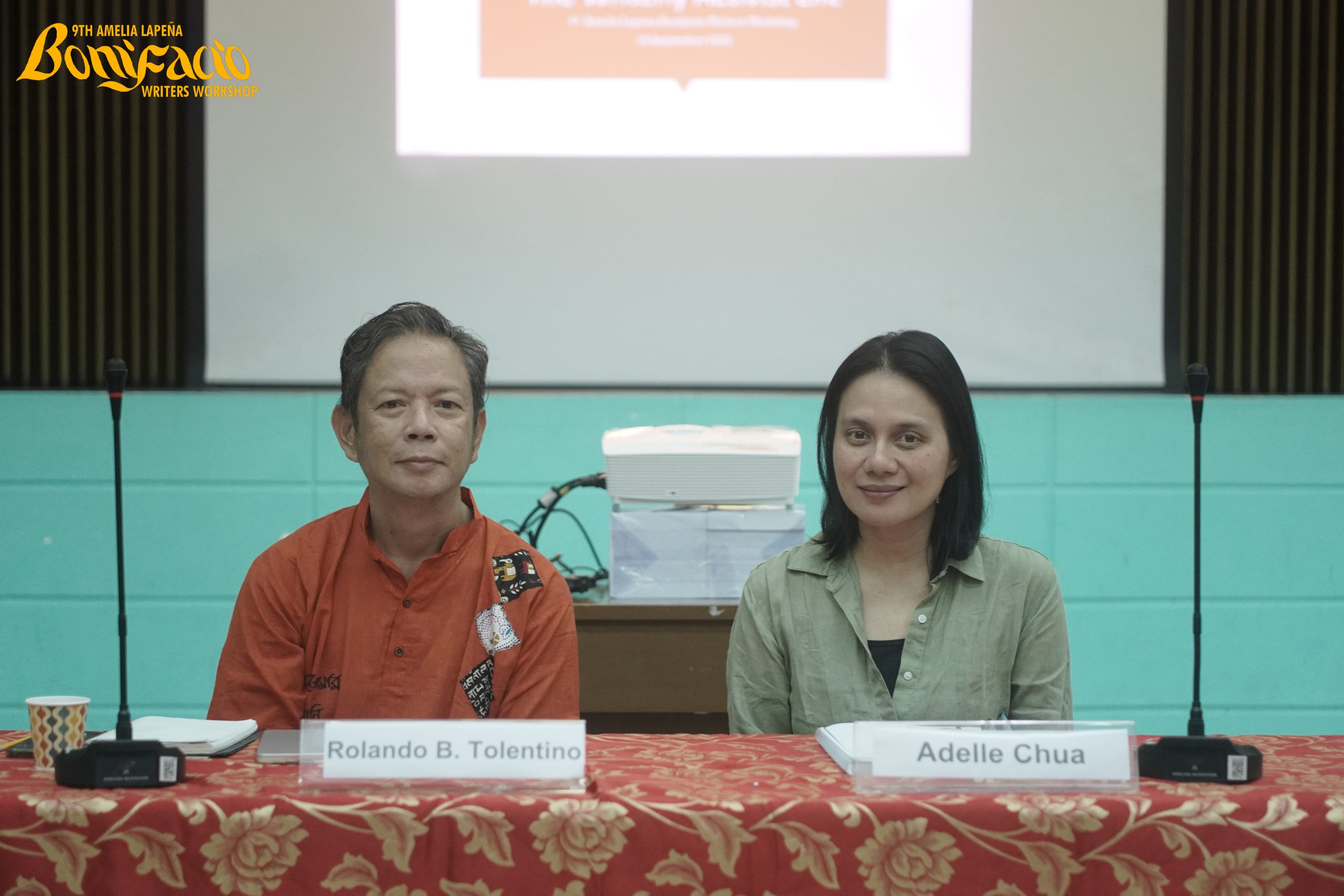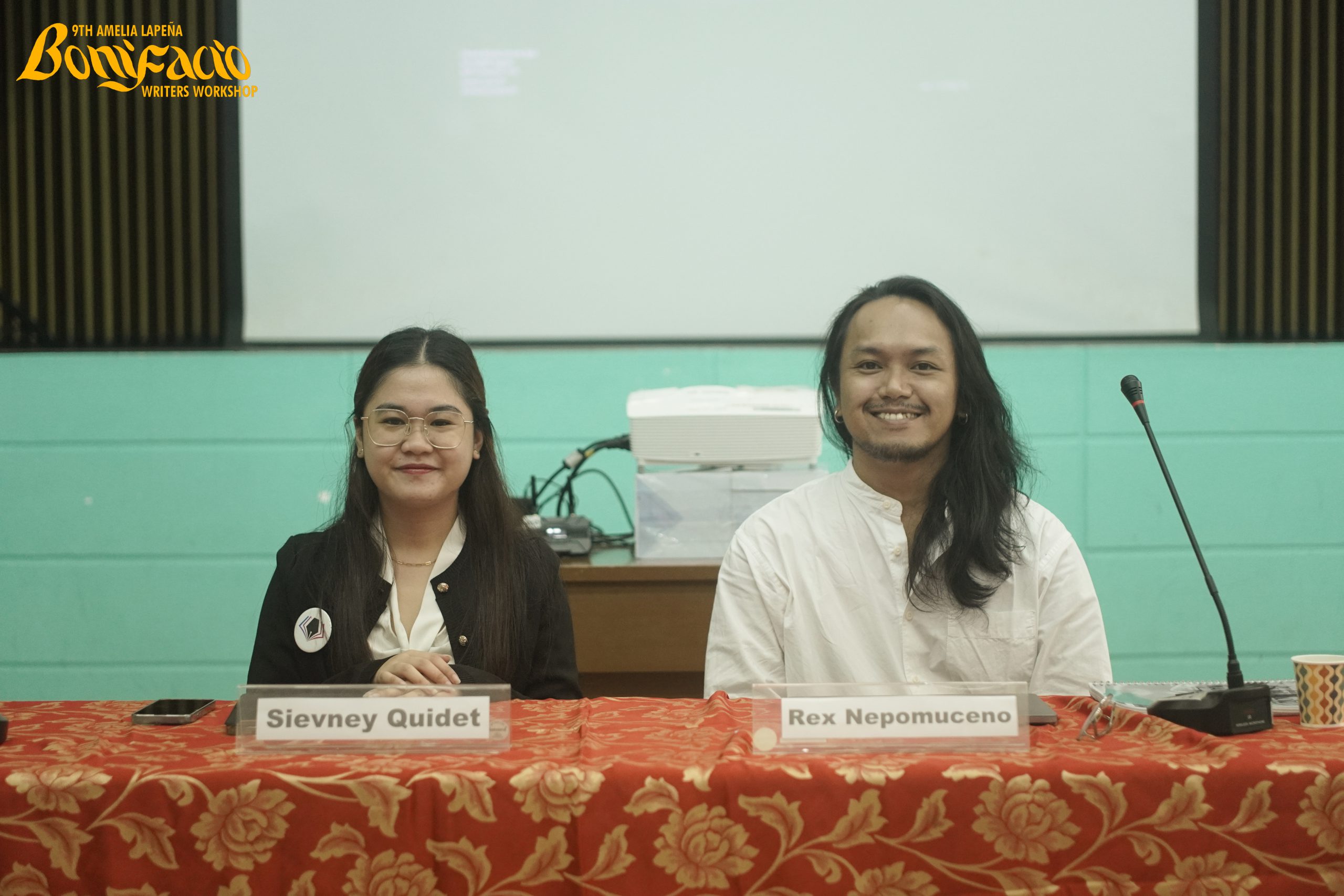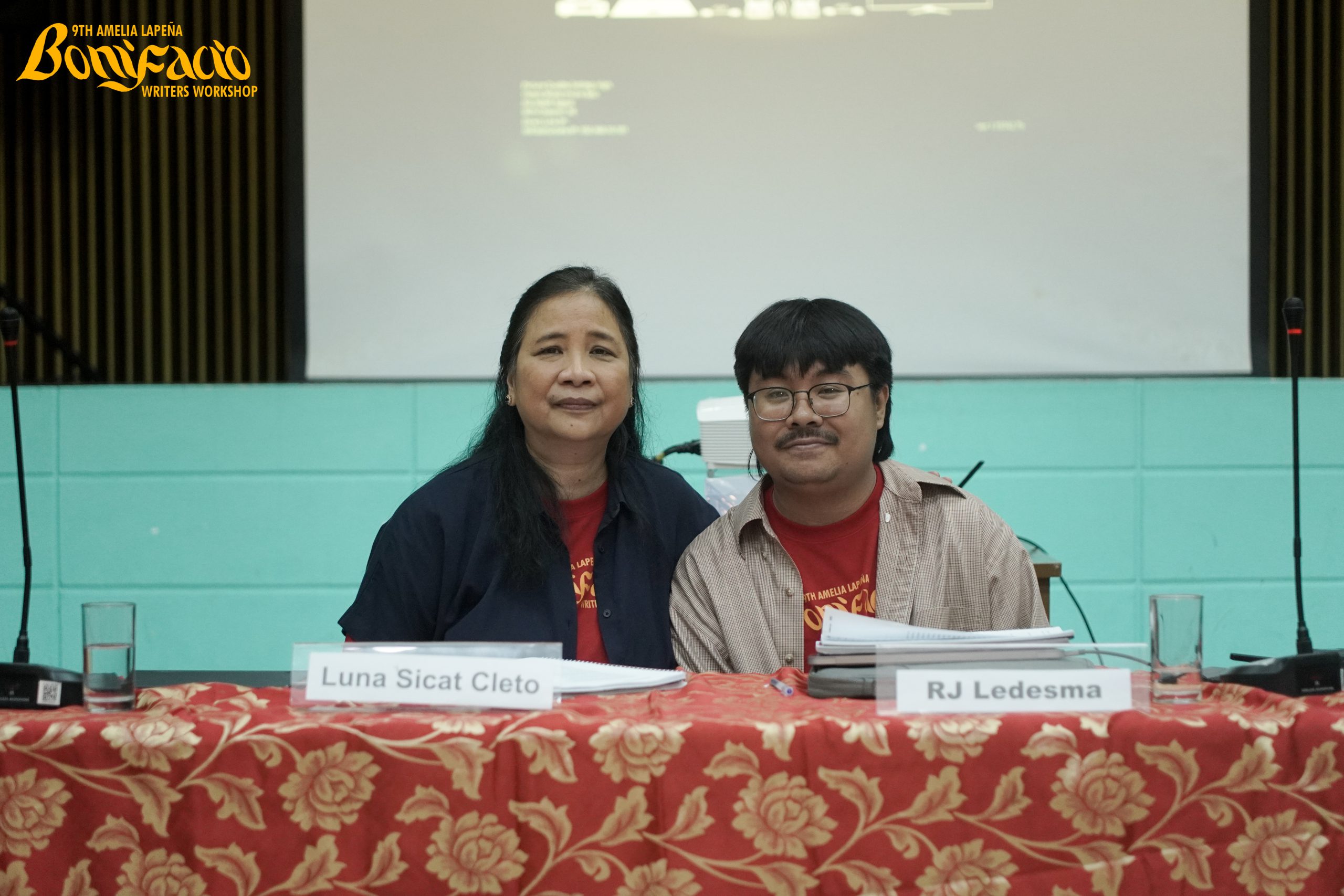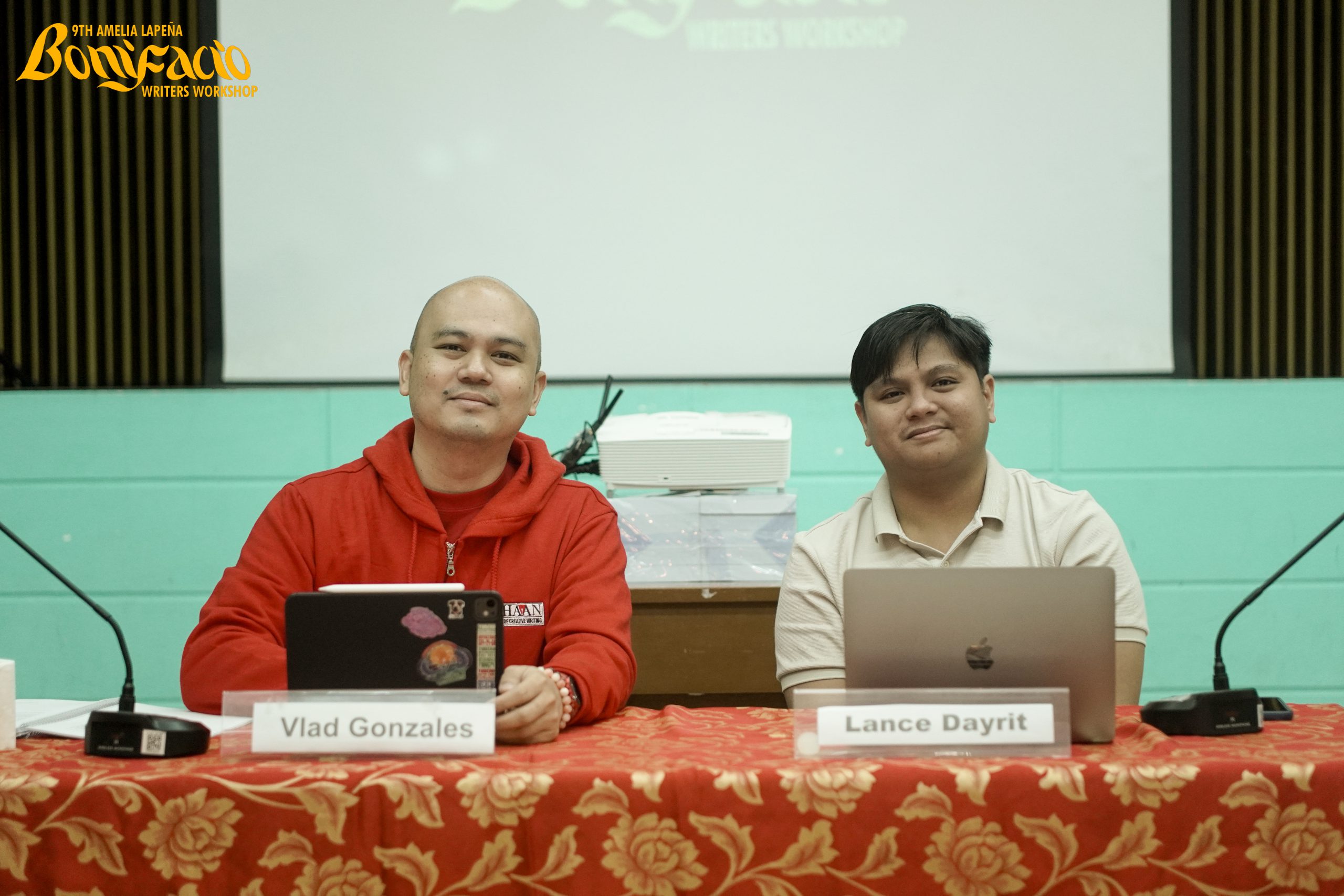Response from the Fellows
Rayji de Guia
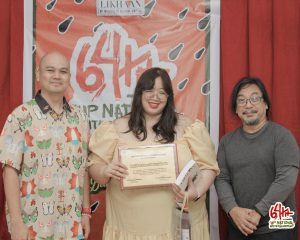
I submitted my draft to the workshop as a woman writing about women, particularly lesbians, in Maragondon, which in my story is Mayabo. As the beginning of the workshop neared, I was conscious of my participation as a woman, with three other women fellows that I was very happy to become roomates and friends with, but sadly we are only four out of twelve fellows. Out of many, we only had three women panelists, none of whom were assigned to my work. Aware of the UP National Writers Workshop’s history as a traditionally masculine space, I arrived in Los Baños with deep apprehension although I was determined to carve that space for women myself, if I have to. Every day, I was surprised to find out that I didn’t have to. My novel is about the maddening experience of fatphobia and lesbian desire in a patriarchal and catholic small town, where maleness is intentionally absent. Kara’s essay grapples with her grief after the death of her father, whose absence for the most of her life, despite other influences, was his own doing. Adelle’s essay is a step-by-step attempt of slowly aiming for a kind of life with her four children in which her then husband is absent, and she does so successfully. The poems in Krysta’s collection mention a father whose absence induces illnesses but hope nonetheless for joy and healing from it. I am a women’s writer. I have come to embrace this label, and my subject position informs even my critique for each session, as you well know now. Perhaps the other women fellows are not using this label explicitly, but we can’t escape ourselves in this way. So I cannot overstate how shocked I was that our writing, and my writing that is intended for a specific audience, is able to reach those outside it. How unexpected and wonderful it was to see and hear conscious effort from the men, fathers, and husbands to engage with our experience, interrogate their own behavior towards the women around them, and encourage other men to reflect. In this workshop, where majority of participants are men, we were given a space that is not only safe but incredibly open, so much so that the men were able to share personal anecdotes that relate to us women as humans, without erasing or dismissing our womanhood. The humaness of our writing is not only acknowledged but also affirmed. The humility we were shown not just in our individual sessions but also in the consultations and chika after the workshop, to further discuss our lives and experiences, intentions and plans, was so fulfilling in ways I cannot describe—the willingness to listen and also invite our voices to join the endless discourses this week. Of course, I am still complaining, and will keep complaining, about how there are not enough women, but these past days assured me of the workshop’s direction towards even better possibilities for narratives in the periphery. I am grateful for new friends in writing, the women, and more. Thank you very much to my co-fellows, panelists, and the staff. Let’s keep talking.
Laurence Lanurias
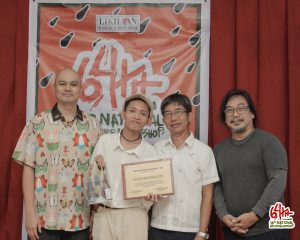
We may not all speak the same language, and sometimes not even the same culture, but the workshop and all the people that comprise it have made it abundantly clear that there is one language we do all share: Philippine Literature. When we speak of Philippine Literature, I remember, at least from the province where I’m from, it usually meant Biag ni Lam-ang, Ibong Adarna, and the likes of which centered around Luzon lit, and I had to scramble around talking to my lola and lolo just to hear Cebu literature from their mouth. I am proud and happy that we are now at an age where Philippine Literature includes all the other regions and that Visayas lit, especially Cebuano, is on the rise with the help of accessible bookstores like Lost Books Cebu. But anyways, a lot of us here today come from a place of scarcity, and I don’t say this in a bad way. Only a little. This scarcity may manifest differently from each other: reading signages and billboards because books are out of the options, family members giving only to themselves, a parent leaving their child behind, a world leaving little room for mistakes and moral ambiguity, online literature and all that it hides in its virtual corners, spaces that refuse to hold non-normative desires, hardly accessible medication and medicinal facilities, the future, and even yesterday. I really believe that it is not only what we have lived but also what we’ve not lived and the scarcities in our lives that we’ve lived through that have shaped our being, that have shaped us as people. Yesterday, I mentioned about poetry being a conversation, and I thank everyone for listening to my story that is my scarcity, that is also my being a bayot, and I am thankful that you gave me the privilege to listen to yours. When I go back to wherever tomorrow brings me, I know I have been made better by our conversations, our poetries. In my bags are not only the clothes I have to wash with the water in Cebu and detergent but also a paper chandelier, a tuna sandwich, a Grab driver—no, I’m sorry, I meant a donut, a Tokhang phone, a vestment, a PhilHealth ID card, a baboy ramo, all of which I will glue on my scrapbook on how to be a writer. Coming home after this trip, may we find ourselves changed by the very act of our returning. Finally, I extend my gratitude to the people of the country as well as the Likhaan ICW faculty and staffs for making this workshop possible. As Danny said on Thursday, may the UP National Writers Workshop hear more from the regions. Thank you.
Response from the Guest Panelist Cris Lanzaderas
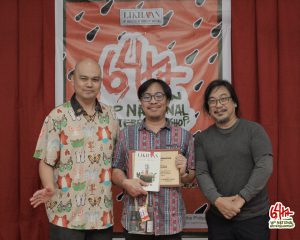
Isang mapagpalayang araw sa inyong lahat. Maraming bersyon ng alamat ni Maria Makiling na nagpasalin-salin na sa bibig at papel ng mga taga-Laguna at Batangas dito sa Timog Katagalugan. Sa muling pagsasalaysay ni Rizal sa mahiwagang Diwata, ikinuwento niya ang pamimigay nito ng gintong luya sa sinomang may mabuting pusong naglalakbay o naliligaw sa kaniyang bundok. Mayroon ding salaysay hinggil sa kaniyang pagtatago dahil sa pagkawalay sa minamahal, dulot ng selos at kasakima kaya nagkubli na lamang siya sa mga dalisdis na naghugis bilang isang babaeng nakahimlay. Gayunpaman, sa napakaraming bersyon at iterasyon ng alamat na ito, pinakapaborito ko ang isang urban legend na naranasan natin sa buong linggong ito. Ayon sa alingasngas, kung nagagambala si Maria Makiling mula sa ingay na kaniyang naririnig, nagpapaulan siya upang mahinto ang pinagmumulan ng gumagambala. Madalas na nararanasan ito tuwing February Fair, ang bersyon ng UP Fair dito sa UP Los Baños. May mga gabi na nade-delay o tuluyan nang kinakansela ang tugtugan dahil sa buhos ng ulan at binabaha ang fair grounds. Marahil ay nagagambala nga si Makiling hindi lamang dahil sa mga gabing halos abutin ng alas dose ang pagbi-videoke kundi makalipas ang halos isang dekada, heto at inaabala natin siya sa inyong mga tula at kuwento, mga puna at komento, mga debriefing sa loob at labas ng hotel. Inuga at niyanig ng inyong mga metapora ang kaniyang pananahimik. Puwera biro, isang karangalan ang mapabilang sa edisyong ito ng UP National Writers Workshop. Nakaka-impostor syndrome, sa totoo lamang, pero sa aking palagay, tama naman. Hindi maitatanggi ang husay ng mga fellows at mga kasamang panelista, ang inyong mga likha. Sa nakalipas na mga araw, ipinakilala nito ang mga tauhan at tagpuang naririto at wala rin dito; dinala tayo ng mga ito sa ibang bundok, sa Libaba, sa mga kusina ng Cebu, sa bayan ng San Rafael, sa karagatan ng New Caledonia, sa yungib ng inyong mga isip, sa haraya ng inyong mga puso; ginalit, niyakap, tinitigan, hinaplos. Naglakbay tayo tulad ng sa alamat ni Makiling at maaaring naligaw subalit sa dulo ng ating pakikipagsapalaran ay ang gintong luya – ang pagkilala na gitna ng kahusayang ito ay espasyo para sa higit pang pagpapaunlad o kung nakikita nating perpekto na ang mga ito, ng pangangailangan pang lumikha. Anoman sa mga ito ang sa palagay natin ay kinahinatnan ng pitong araw na pagsasama-sama natin sa piling ni Makiling, nawa ay na-nourish tayo ng mapagbigay na ulan. Kung nagambala man ang Maria ng Elbi, then so be it. Markado na niya ang inyong mga mukha at aantabayanan na ang inyong pagbabalik. Maraming-maraming salamat sa pagbabahagi ng inyong talento dito sa bayan ng mga paliguan. Uuwi tayong lahat na basa at lunod sa panitikan.



